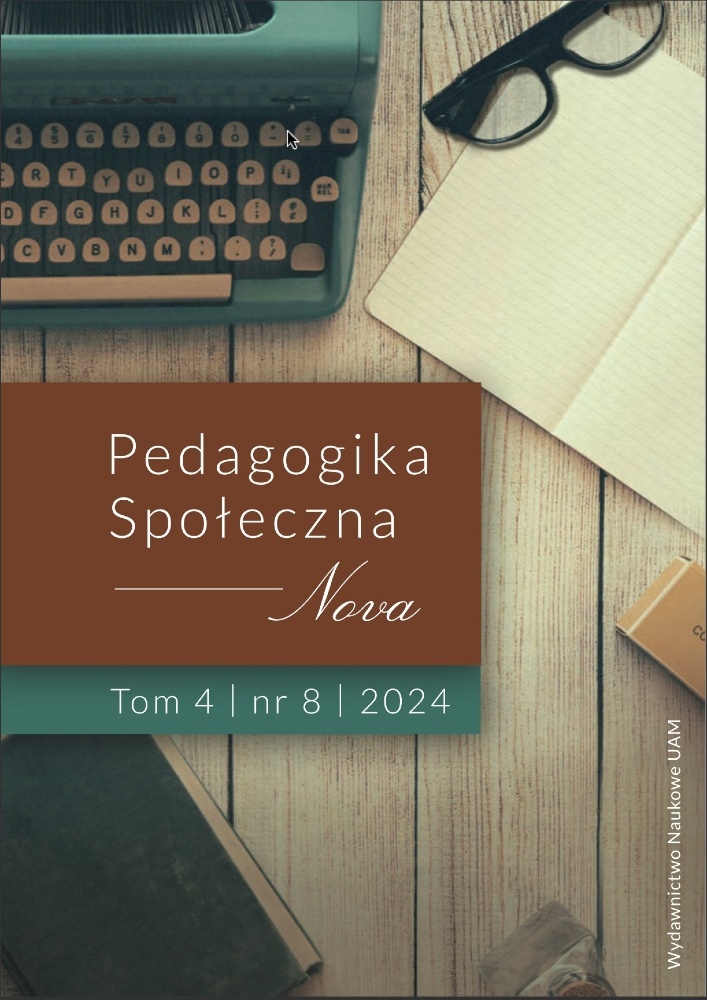Abstract
Nowadays, the media play a significant role in human life. They make it easier to obtain information, provide entertainment, make everyday life easier and are part of it. Nowadays, children use them from an early age. The use of media influences a young person’s development, which, depending on many factors, may have both positive and negative effects. In the article, we present the development of a preschool child and the role that media can play in human life. We also present the results of research conducted on a group of 115 people, the aim of which was to examine parents’ opinions on the correlation between media use by a preschool child and the development of his or her speech.
References
Bednarska N., Konsekwencje obecności mediów elektronicznych w życiu dziecka dla rozwoju mowy, [w:] N. Bednarska (red.), Dziecko – media – rozwój. O konsekwencjach obecności mediów w życiu dziecka, Warszawa 2020, s. 97–120.
Brzozowska I., Sikorska I., Wpływ telewizji na rozwój poznawczy dzieci poniżej 3. roku życia – przegląd badań, „Developmental Period Medicine” 2016, (1), s. 75–81.
Cieszyńska-Rożek J., Wpływ wysokich technologii na rozwój poznawczy dzieci w wieku niemowlęcym i poniemowlęcym, [w:] A. Ognowska, G. Ptaszek (red.), Człowiek – technologia – media. Konteksty kulturowe i psychologiczne, Kraków 2014, s. 11–22.
Close R., Television and language development in the early years. A review of the literature, London 2004.
Demel G., Elementy logopedii, Warszawa 1979.
Fisch S.M., Truglio R.T., Cole C.F., The impact of Sesame Street on preschool children: A review and synthesis of 30 years’ research, „Media Psychology” 1999, 1(2), s. 165–190. DOI: https://doi.org/10.1207/s1532785xmep0102_5
Gajda J., Media w edukacji, Kraków 2014.
Kaczmarek L., Nasze dziecko uczy się mowy, Lublin 1988.
Kirkorian H.L., Wartella E.A., Anderson D.R., Media and young children’s learning, „The Future of Children. Children and Electronic Media” 2008, 18(1), s. 39–61. DOI: https://doi.org/10.1353/foc.0.0002
Konderak T., Rozwój psychofizyczny dziecka w wieku przedszkolnym, „Edukacja Elementarna w Teorii i Praktyce” 2010, (15–16/1–2), s. 115–123.
Kuros-Kowalska K., Opóźniony rozwój mowy a nowe technologie. Doniesienia z badań, „Logopaedica Lodziensia” 2021, (5), s. 105–121. DOI: https://doi.org/10.18778/2544-7238.05.07
Kühhirt M., Klein M., Parental education, television exposure, and children’s early cognitive, language and behavioral development, „Social Science Research” 2020, 86, 102391. DOI: https://doi.org/10.1016/j.ssresearch.2019.102391
Lindzey G., Hall C., Campbell J.B., Teorie osobowości, przeł. J. Radzicki, J. Kowalczewska, M. Zagrodzki, Warszawa 2006.
Niedenthal P.M., Krauth-Gruber S., Ric F., Zrozumieć emocje. Perspektywy poznawcze i psychospołeczne, przeł. R. Abramciów, I. Ocetkiewicz, J. Kryg, A. Lasota, Kraków 2016.
Osiński W., Antropomotoryka, Poznań 2003.
Patzlaff R., Zastygłe spojrzenie. Fizjologiczne skutki patrzenia na ekran a rozwój dziecka, przeł. B. Kowalewska, Kraków 2008.
Rice M.L., Huston A.C., Truglio R., Wright J.C., Words from „Sesame Street”: Learning vocabulary while viewing, „Developmental Psychology” 1990, 26(3), s. 421–428. DOI: https://doi.org/10.1037//0012-1649.26.3.421
Strykowski W., Media wyznacznikiem zmian w edukacji, „Neodidagmata” 2003, (25/26) s. 25–35.
Strykowski W., Technologia kształcenia i pedagogika medialna jako nauki o mediach, „Neodidagmata” 1996, (22), s. 3–14.
Szopa J., Mleczko E., Żak S., Podstawy antropomotoryki, Warszawa 2000.
Trempała J., Wczesne kompetencje poznawcze w rozwoju dziecka, „Warmińsko-Mazurski Kwartalnik Naukowy, Nauki Społeczne” 2012, 2, s. 9-22.
Żmijewska A., Procesy poznawcze, „Psychologia, Zeszyt naukowy” 2011, (2), s. 11–22.
License
Copyright (c) 2024 Weronika Błaszczyńska, Dominika Troszczyńska

This work is licensed under a Creative Commons Attribution-NonCommercial-NoDerivatives 4.0 International License.

